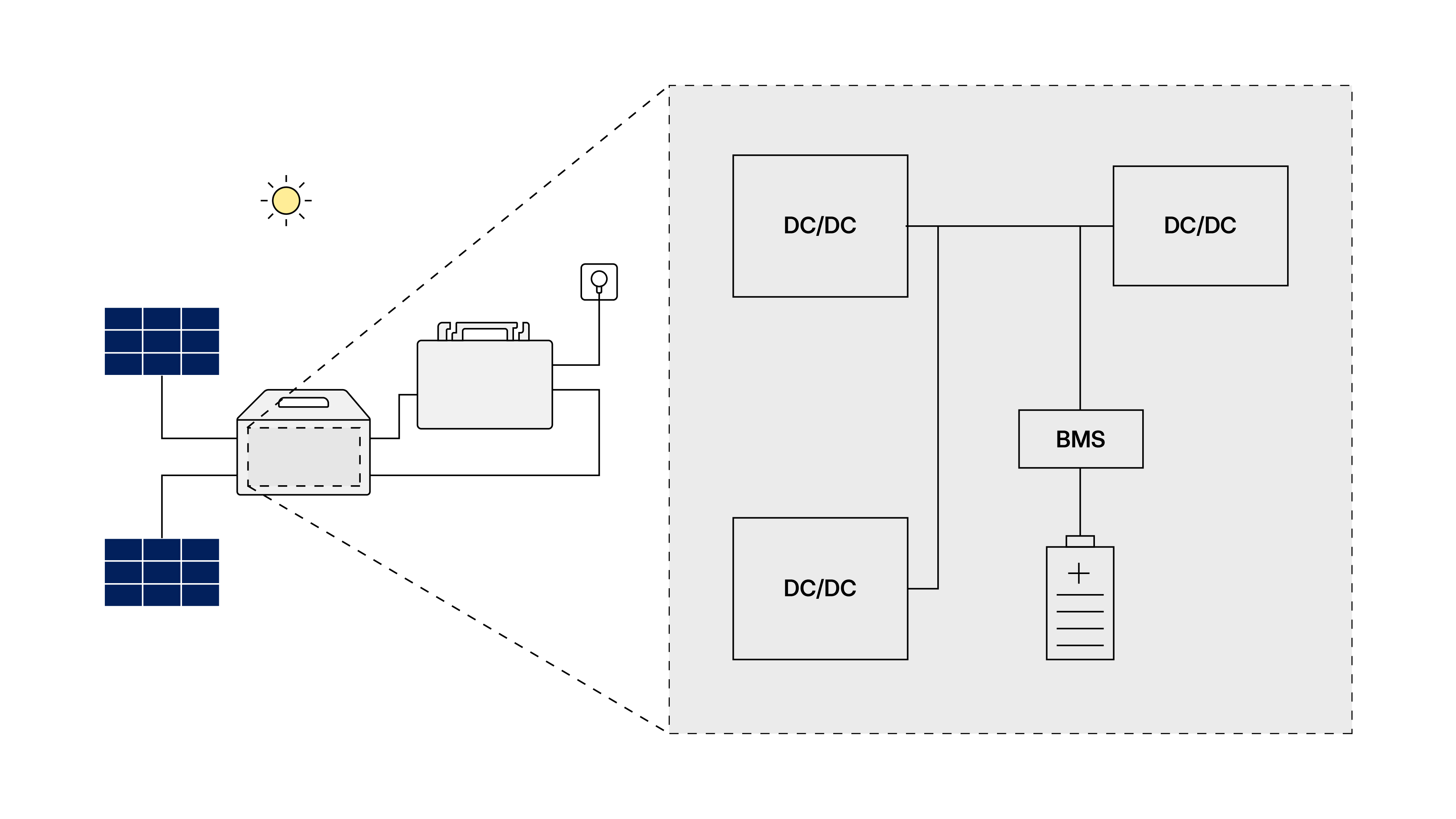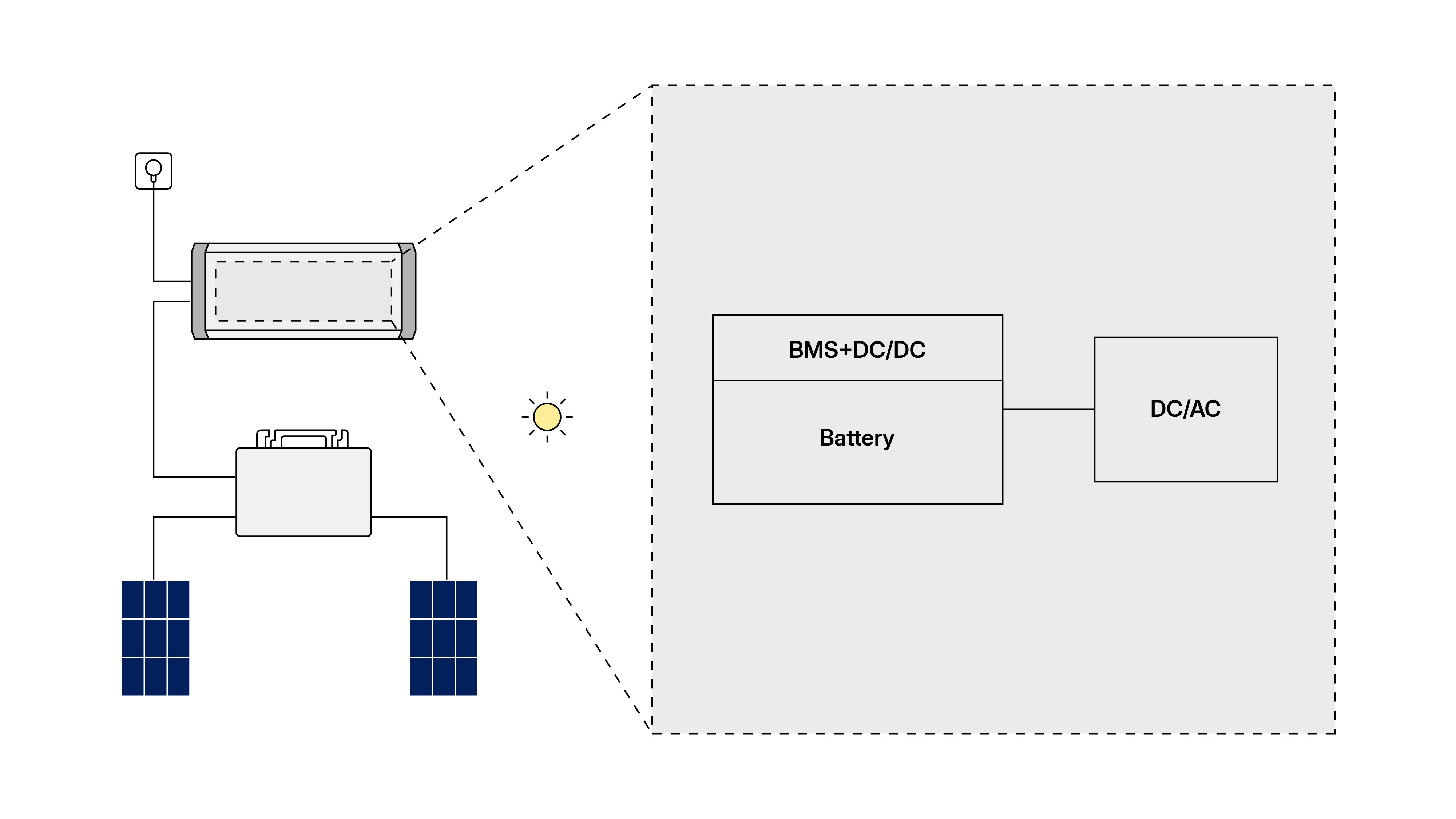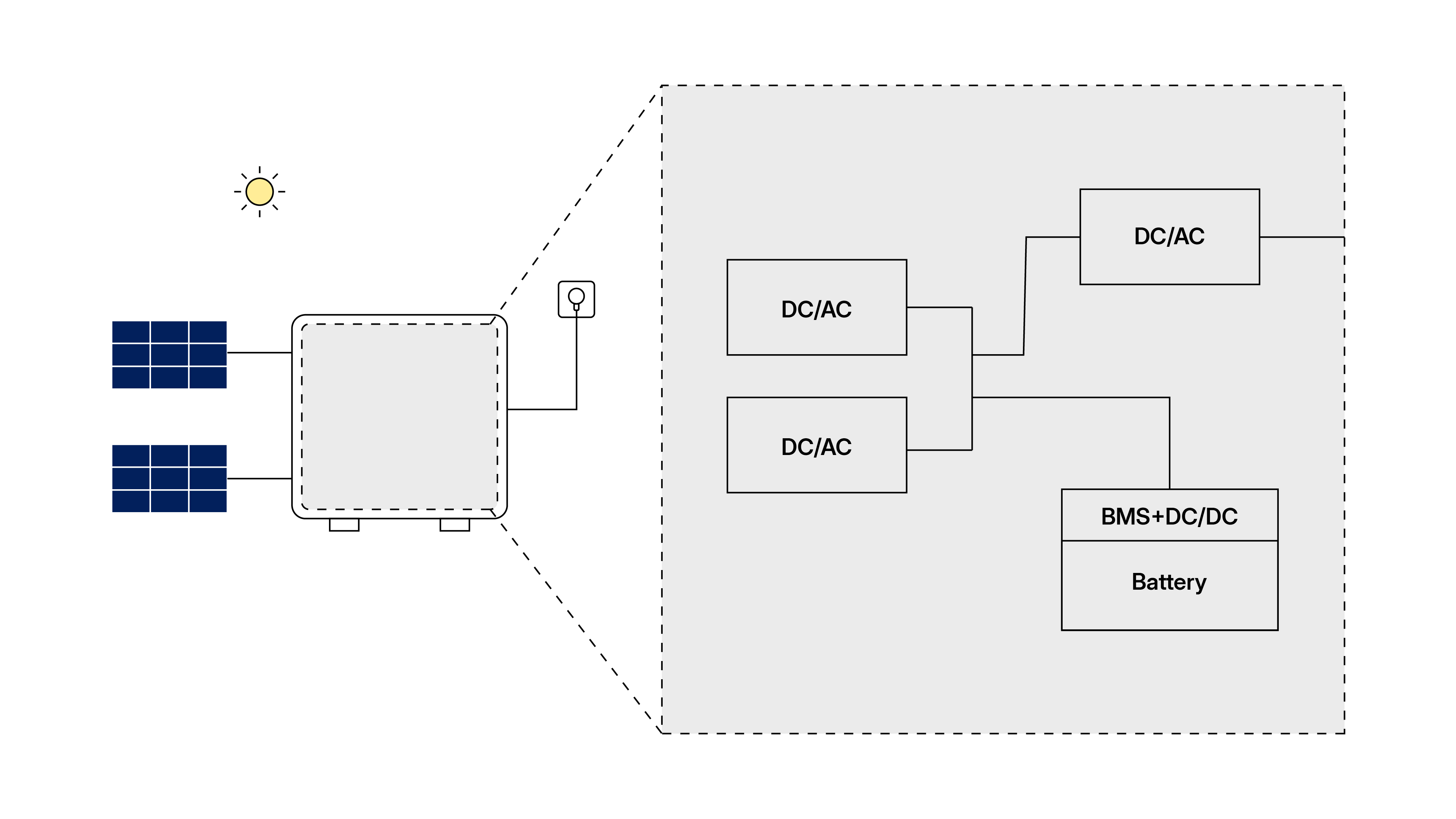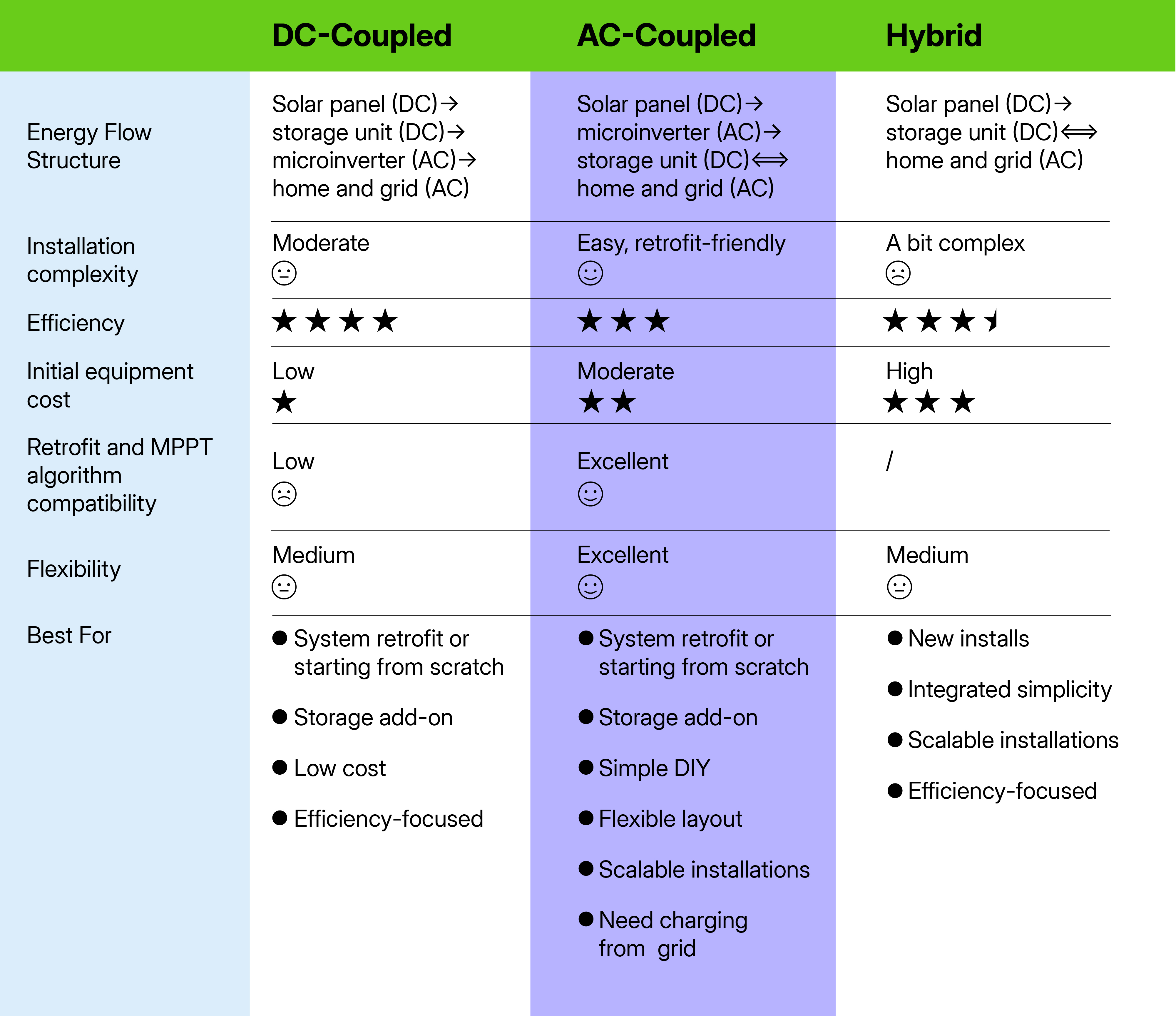DC- Coupled vs AC- Coupled vs Hybrid Solar Battery Storage: Which Is Best for Your Home?
Compare DC- coupled and AC- coupled and hybrid home solar battery storage systems. Learn how to choose the best plan for your home.

As morWhat are the benefits of an AC-coupled battery storage system?e homeowners adopt solar systems, adding battery backup, or micro storage, becomes a great choice to achieve power independence and energy resilience. How to choose a suitable solution for your home? Which configuration is best, DC- coupled, AC- coupled or hybrid solar battery system? This blog will guide you through what their differences are and how to choose th best one for your application scenario.
Before we dive into the details, let’s make sure you already understand these key concepts:
What are the benefits of a DC-coupled battery storage system?DC (Direct Current) is the type of electricity generated by solar panels and stored in batteries.
AC (Alternating Current) is the form of electricity produced by microinverters, supplied by the grid, and used by most home appliances.
How a typical solar battery system works: Solar panels capture the sunlight and transform it into DC power which then feeds into the microinverter and comes out as usable AC power for your home. If your microinverter generates more power than you need, that AC power is stored in your battery in the form of DC electricity.
If you are looking for a large residential solution rather than a DIY home battery storage system, head for this blog to know how to add battery storage to your solar system.
What is a DC-coupled battery storage system?
Simply put, in a DC-coupled solar battery storage system, the battery is installed with solar panels instead of on the AC/grid side of the system. In such systems, DC power from the solar panels will directly charge solar batteries, with no intermediary conversion to AC. Then the battery system will be connected to microinverter, so that DC energy is converted into AC energy for home use. So in a DC-coupled solar battery storage system, only one conversion is needed.

Components in the square compose the DC-coupled battery storage unit
What are the benefits of a DC-coupled battery storage system?
Efficient energy conversion: Given that only one conversion is needed in the system, the DC-coupled solution has less energy lost and is known for its high system efficiency.
Lower hardware cost: The system uses fewer components, so it’s easier for new solar homeowners to start out.
Things to note about a DC-coupled battery storage system
Less compatibility: DC-coupled systems face compatibility problems as different microinverter brands have unique MPPT algorithms. In fact, no manufacturers can ensure a 100% algorithm match between the storage unit and different microinverter brands, so compatibility issues are inevitable for DC-coupled solutions.
Low flexibility and high energy loss: Extension cables are needed to connect solar panels to the storage unit because they are normally installed in different places, say panels are placed outside while the battery is set up indoors. Long connection also leads to energy loss in transmission.
Retrofit challenge: If you already installed a PV system and want to add battery storage, you must use extension cables either on the DC side or the AC side, depending on where you put the storage unit. Too many cables can cause wiring mistakes and can make the whole system look messy if not dealt with properly.
Shorter lifespan: Microinverters are typically designed to operate only during the daytime when sunlight is available. In a DC-coupled storage setup, however, the system must also work at night to keep the energy flow. Running 24/7 without rest can significantly reduce the microinverter’s lifespan.
When should you choose a DC-coupled battery storage?
A DC-coupled battery storage solution is more suitable if:
You already have a solar system in your home and now you want to add battery backup.
You are looking for a more affordable plan.
You are OK with the time- and effort-consuming wiring steps.
What are AC-coupled battery storage systems?
Instead of connecting to the solar panel/DC side of the system, AC-coupled battery storage is located on the grid/AC side where the microinverter feeds AC power that’s already inverted from DC into the energy storage equipment.

Components in the square compose the AC-coupled battery storage unit
DC-coupled solution operates single-way from DC to AC, so it cannot draw power from the grid for home use. By contrast, AC-coupled storage is capable of making bi-directional power conversion from DC to AC and from AC to DC, so you can import grid power to charge your battery at off-peak hours.
What are the benefits of an AC-coupled battery storage system?
AC-coupled solution is known for its simplicity and flexibility. whether you are retrofitting your existing solar power station or you simply want to add battery storage function. Take Hoymiles’ latest HiBattery AC as an example:
Strong compatibility: This approach eliminates compatibility issues associated with different MPPT algorithms, ensuring seamless integration with all microinverter brands.
Simple retrofit for existing solar setups: A few plugs will do to complete the retrofit or battery addition.
High flexibility: When supported by smart meters, Hoymiles HiBattery AC can be installed anywhere, making it not only ideal for balcony solar, but also for other residential scenarios.
Easy scalability: If you want a capacity expansion, just add multiple energy storage units or microinverters as needed. The battery storage and system output power both grow.
Maximize savings: Can charge battery from the grid or solar to maximize savings.
Versatile application: Can be used as a battery bank or emergency power supply in off-grid settings such as camping.
Things to note about an AC-coupled battery storage system
AC-couple battery system features multiple energy conversions:
Grid to micro storage | AC to DC |
Micro storage to home appliances | DC to AC |
Solar panel to microinverter to micro storage | DC to AC to DC |
Therefore, the overall efficiency is a bit lower than DC-coupled one. But the difference is minimal and wouldn’t impact much on total yields.
When should you choose an AC-coupled battery storage?
AC-coupled system is ideal for both system retrofitting and new setups.
For system retrofitting: Compared with a DC-coupled system, AC-coupled retrofitting only requires a few plugs and is much easier.
For new setups: AC-coupled battery storage is especially suitable if flexibility and clean system layout are what you are looking for. For example, you may want to install the panels outdoors and keep the battery indoors, then just plug Hoymiles’ HiBattery AC into any socket available in your room—no extension cables needed at all.
For Hoymiles’ latest HiBattery AC and the previous MS solution, you can either connect the microinverter to the micro storage or plug them respectively into different sockets. As a result, there is no installation limit and you can put it anywhere, such as in garage, courtyard and bedroom, making it more than a balcony system, but a versatile energy storage solution for your home.
Specifically, an AC-coupled battery storage solution is more suitable if:
You already have a solar PV system and want to add storage
You are seeking a more flexible installation
You don’t want to have any compatibility issues
You want minimal installation effort
What is a hybrid solar battery system?
Hybrid solar power systems with battery combine the functions of DC- and AC-coupled solutions. In other words, they integrate storage inverter and battery in a single unit.
In AC-coupled systems, solar panels must be connected with microinverters, but in a hybrid solar system, solar panels are directly plugged into the storage unit.

Components in the square compose the AC-coupled battery storage unit
As shown in the above wiring diagram, a hybrid solar battery system handles:
DC input from solar panels
Power conversion into energy stored in battery
DC-AC and AC-DC bidirectional conversion for home use
What are the benefits of a hybrid solar battery system?
Simple system and less upfront cost: The most obvious advantage of a hybrid solar battery system is that it requires fewer components and thus has less upfront cost.
Higher efficiency and less energy loss: A Hybrid micro storage system requires no energy conversion between multiple components, so there is less energy loss.
Easy expansion: For most hybrid solutions, you just stack multiple batteries to scale up the storage capacity.
Things to note about a hybrid storage battery system
Though a hybrid storage battery system has a simple composition, the wiring is not as easy as it seems. Unlike an AC-coupled solution that requires no more than plug-and-play, a hybrid system still needs some wiring efforts.
Moreover, even if you can expand your storage capacity by adding more batteries, your system’s output power is fixed and you cannot raise the overall system capacity with this.
When should you choose a hybrid solar battery system?
Given the benefits and drawbacks of the hybrid solar battery system, it is ideal if:
You are starting from scratch and looking for a simple and cost-effective way to set up your solar storage system.
You want to start small and add more batteries as your demand grows.
Your solar panels and battery are not far apart (long extension cables mean greater energy loss).
How to choose the best battery storage solution for your home? Let’s sum up
Let’s recap the key features and differences of DC-coupled vs AC-coupled vs hybrid battery storage system:
 Before you make any decision, ask yourself:
Before you make any decision, ask yourself:
Are you starting a new solar build or retrofitting your existing one?
Is efficiency a priority, or is flexibility and scalability more important?
What’s your budget and layout constraints?
Explore Hoymiles HiBattery home energy storage solution
HiBattery is Hoymiles’ latest AC-coupled plug-in product offer that makes homeowners’ balcony solar & storage experience easier than ever with “less expenditure, less effort and less worries”. The AC-coupled technology makes HiBattery 100% compatible with all inverters and it can be placed anywhere in your home, be it balcony, garage, bedroom, or courtyard.
The installation requires nothing more than a few plugs. The unparalleled safety, flexible placement and excellent savings set Hoymiles’ DIY battery storage apart from similar solutions.
We offer three microinverters for seamless pairing with HiBattery:
HiFlow 800 1-in-1 series: 800 W output power
HiFlow 800 Pro 2-in-1 series: 600/700/800/900/1000 W output power options
HiFlow 1600 Pro 4-in-1 series: 1600/1800/2000 W output power options
The HiBattery system can be used on-grid and off-grid, and the HiBattery alone can also serve as a power bank to sustain appliances. If you are looking for an ultra-simple, flexible and versatile balcony energy storage solution, HiBattery is your best choice.
Check out our detailed guide on how to use HiBattery in different scenarios and how to choose the best package for your needs.
Subscribe to our newsletter andget the latest news!
